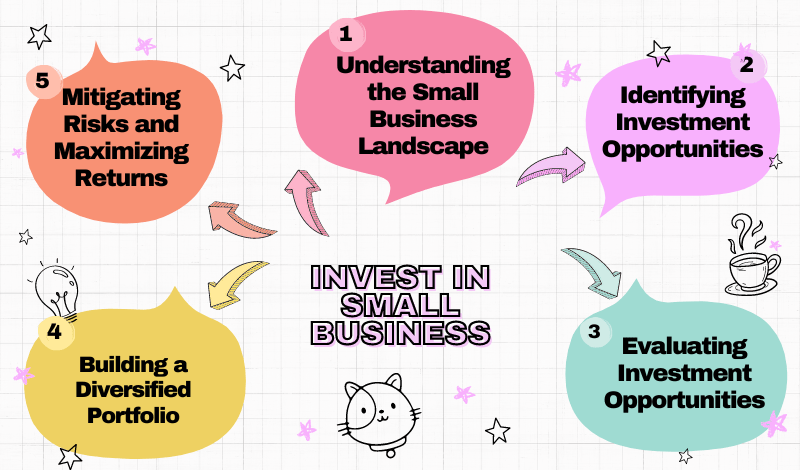The Ultimate Guide to Investing in Small Businesses
Invest in Small Businesses: Investing in small businesses can be an incredibly rewarding experience, both financially and personally. Not only do you have the opportunity to support entrepreneurship and local economies, but you also have the potential to earn significant returns on your investment. However, investing in small businesses comes with its own set of challenges and risks. In this comprehensive guide, we’ll explore the ins and outs of investing in small businesses, covering everything from identifying promising opportunities to mitigating risks and maximizing your chances of success.
1. Understanding the Small Business Landscape
Invest in Small Businesses: Before we dive into the specifics of investing in small businesses, it’s crucial to understand the landscape. Small businesses are often defined as companies with fewer than 500 employees, though the definition can vary depending on the industry and country. These businesses play a vital role in driving economic growth, innovation, and job creation.
Invest in Small Businesses: One of the key advantages of investing in small businesses is the potential for higher returns. While larger, established companies may offer more stability, small businesses have the ability to grow rapidly and provide significant returns if they succeed. However, it’s essential to recognize that investing in small businesses also carries a higher degree of risk, as many startups and small companies struggle to survive in the competitive market.
2. Identifying Investment Opportunities
Invest in Small Businesses: When it comes to investing in small businesses, there are several avenues to explore. One popular option is angel investing, where individuals provide capital to startups or early-stage companies in exchange for equity. Angel investors often take an active role in mentoring and advising the entrepreneurs they invest in, leveraging their experience and network to help the business grow.
Invest in Small Businesses: Another avenue is investing in small business investment funds or venture capital firms. These entities pool money from multiple investors and invest in a diverse portfolio of small businesses, spreading the risk across multiple companies. While this approach may offer lower potential returns compared to direct angel investing, it also provides diversification and the expertise of professional fund managers.
Invest in Small Businesses: Crowdfunding platforms, such as Kickstarter and Indiegogo, have also emerged as a viable option for investing in small businesses. These platforms allow entrepreneurs to pitch their ideas and businesses to a wide audience of potential investors, who can contribute funds in exchange for rewards, equity, or other incentives.
3. Evaluating Investment Opportunities
Invest in Small Businesses: Regardless of the investment avenue you choose, it’s crucial to conduct thorough due diligence before committing your capital. Here are some key factors to consider when evaluating small business investment opportunities:
1. The Business Plan and Idea
– Assess the strength and feasibility of the business idea, as well as the competitive landscape.
– Evaluate the market potential and growth prospects for the product or service.
2. The Management Team
– Carefully scrutinize the experience, skills, and track record of the founders and management team.
– Strong leadership and execution capabilities are essential for small business success.
3. Financial Analysis
– Review the company’s financial projections, revenue streams, and potential profitability.
– Evaluate the capital requirements and the intended use of the investment funds.
4. Exit Strategy
– Consider how you will eventually exit the investment, whether through an acquisition, initial public offering (IPO), or other means.
– An exit strategy is crucial for realizing returns on your investment.
5. Legal and Regulatory Considerations
– Understand the legal and regulatory environment surrounding the small business and its industry.
– Ensure that the company is compliant with all relevant laws and regulations.
6. Risk Assessment
– Identify and evaluate the potential risks associated with the investment, such as market risks, operational risks, and regulatory risks.
– Develop strategies to mitigate and manage these risks effectively.
4. Building a Diversified Portfolio
Diversification is a key principle when investing in small businesses. Just as you wouldn’t put all your eggs in one basket in the stock market, it’s essential to spread your investments across multiple companies and sectors. This approach helps mitigate the risks associated with any single investment and can increase your chances of achieving overall success.
When building your small business investment portfolio, consider factors such as industry diversification, geographic diversification, and stage of growth diversification. For example, you might invest in a mix of technology startups, consumer product companies, and service-based businesses across different regions and at various stages of growth (seed, early-stage, growth, etc.).
Additionally, consider diversifying your investment strategies by combining direct angel investments with investments in small business investment funds or crowdfunding campaigns. This approach allows you to leverage the expertise of professional fund managers while also maintaining a hands-on role in certain investments.
5. Mitigating Risks and Maximizing Returns
Invest in Small Businesses, Investing inherently carries a higher degree of risk compared to more traditional investment vehicles. However, there are strategies you can employ to mitigate these risks and maximize your chances of achieving strong returns:
1. Conduct Thorough Due Diligence
– As mentioned earlier, thorough due diligence is crucial when evaluating small business investment opportunities.
– Don’t rely solely on the entrepreneur’s pitch or the company’s promotional materials. Dig deeper and validate claims independently.
2. Negotiate Favorable Terms
– As an investor, you have leverage to negotiate favorable terms, such as preferred equity, board representation, or specific rights and protections.
– Seek professional legal and financial advice to ensure your interests are protected.
3. Actively Engage and Mentor
– If you’re an angel investor, take an active role in mentoring and advising the entrepreneurs you invest in.
– Leverage your experience, network, and expertise to help guide the business towards success.
4. Monitor Performance and Milestones
– Establish clear performance milestones and regularly monitor the company’s progress.
– Be prepared to provide additional capital or make tough decisions if the business underperforms.
5. Seek Professional Advice
– Consider working with experienced advisors, such as accountants, lawyers, or investment professionals, who specialize in small business investments.
– Their expertise can help you navigate complex legal, financial, and regulatory issues.
6. Leverage Tax Advantages
– Depending on your location, there may be tax advantages or incentives available for investors in small businesses.
– Consult with a tax professional to maximize these benefits and minimize your tax liability.
The Role of Angel Investors and Venture Capitalists
Invest in Small Businesses, Angel investors and venture capitalists play a crucial role in the small business investment ecosystem. These individuals and firms provide not only capital but also invaluable expertise, mentorship, and connections to help small businesses grow and succeed.
Invest in Small Businesses, Angel investors are typically high-net-worth individuals who invest their own capital in early-stage companies, often taking an active role in guiding the business. They bring a wealth of experience, industry knowledge, and connections to the table, which can be invaluable for entrepreneurs navigating the challenges of starting and growing a business.
Invest in Small Businesses, Venture capitalists, on the other hand, are professional investors who manage investment funds on behalf of institutional investors, such as pension funds or endowments. They typically invest in later-stage companies with proven business models and growth potential. Venture capitalists bring expertise in areas such as financial management, strategic planning, and exit strategies, which can be crucial for scaling and eventually exiting the investment.
Invest in Small Businesses, Both angel investors and venture capitalists play a vital role in the small business investment ecosystem, providing capital, guidance, and resources to help promising companies succeed. As an investor, building relationships and networks within these communities can open up new investment opportunities and provide access to valuable resources and expertise.
The Future of Small Business Investing
The landscape of small business investing is constantly evolving, with new technologies, investment models, and regulatory changes shaping the industry. Here are some trends and developments to watch out for in the future:
1. Crowdfunding and Online Investment Platforms
– Crowdfunding platforms and online investment marketplaces are making it easier for individual investors to access small business investment opportunities.
– These platforms are democratizing access to capital and providing new avenues for entrepreneurs to raise funds.
2. Regulatory Changes and Investor Protections
– Governments and regulatory bodies are continuously adapting laws and regulations to keep pace with the evolving investment landscape.
– Investor protections, such as accredited investor rules and disclosure requirements, may change to promote or restrict certain investment practices.
3. Emerging Technologies and Disruptive Business Models
– Advances in technology, such as artificial intelligence, blockchain, and the Internet of Things, are enabling new and disruptive business models.
– Investors must stay informed about these developments and their potential impact on small businesses and investment opportunities.
4. Social and Environmental Impact Investing
– There is a growing trend towards impact investing, where investors seek to generate positive social or environmental impact alongside financial returns.
– Small businesses focused on sustainable practices, social enterprises, or green technologies may become increasingly attractive investment targets.
5. International Investment Opportunities
– As economies globalize and emerging markets continue to grow, international small business investment opportunities may become more prevalent.
– Investors must navigate cultural, legal, and regulatory differences when considering these opportunities.
Conclusion: Invest in Small Businesses
Invest in Small Businesses, Investing can be an incredibly rewarding journey, both financially and personally. By supporting entrepreneurship and innovation, you have the opportunity to make a tangible impact on local economies while potentially earning significant returns on your investment.
Invest in Small Businesses, it’s crucial to approach small business investing with caution, due diligence, and a well-diversified portfolio. Carefully evaluate each opportunity, conduct thorough research, and seek professional advice when necessary. Remember to mitigate risks through strategies such as active mentorship, performance monitoring, and leveraging tax advantages.
Invest in Small Businesses, As the landscape of small business investing continues to evolve, stay informed about emerging trends, regulatory changes, and new investment models, such as crowdfunding platforms and impact investing. Embrace these developments with an open mind, as they may present exciting opportunities to align your investments with your values and contribute to positive social or environmental change.
Invest in Small Businesses, Ultimately, investing in small businesses is about more than just financial returns; it’s about fostering entrepreneurship, driving innovation, and contributing to the growth and vitality of local communities. By approaching this endeavor with thoughtfulness, patience, and a long-term perspective, you can not only potentially achieve financial success but also leave a lasting impact on the businesses and communities you support.
Invest in Small Businesses, So, whether you’re an experienced investor or just starting your journey, embrace the challenges and rewards of investing in small businesses, and be part of the driving force behind the success stories of tomorrow.











